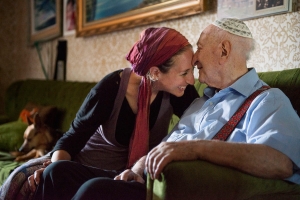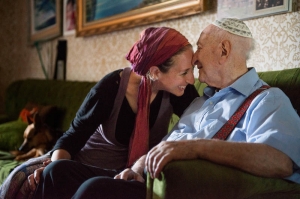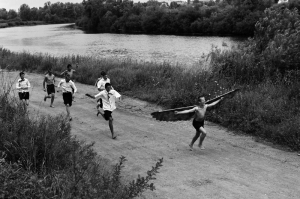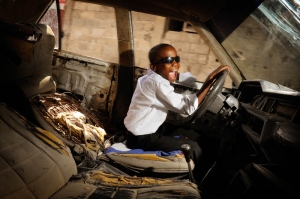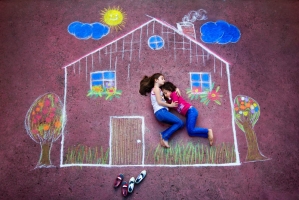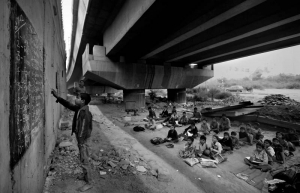Winners of the Alfred Fried Photography Award 2016
Sub-Categories
-
 The winners of the Alfred Fried Photography Award 2016
The winners of the Alfred Fried Photography Award 2016
-
The winners of the Alfred Fried Photography Award 2016, who received the Alfred Fried Peace Medal are (in alphabetical order):
"Devoted to Life", Helena Schätzle, Germany
"Eclipse Time", Boris Register, Russian Federation
"I Have a Dream", Chris de Bode, Netherlands
"Peace and Tranquility", Leyla Emektar, Turkey
"School for the Less Fortunate", Altaf Qadri, India
Click on the title to see the complete story.
Winner of the Alfred Fried Photography Award's world-best picture on the theme of peace, worth € 10000, is Helena Schätzle, Germany, with an image from her work "Devoted to Life"
The winning picture will be on display for one year at the Austrian Parliament.
-
 Helena Schätzle, Germany
Helena Schätzle, Germany
-
Devoted to Life
Survivors of the Holocaust were liberated more than seventy years ago, but their traumatic experiences continue to shape their lives. Living with the past: what does this entail for the survivors and their families?
I spent many months accompanying survivors of the Holocaust and their families in Israel. Photos and stories from four generations reveal the emotional traces of a still very present past but also a regained happiness in the present, coupled with an extraordinary vitality, appreciation and devotion to life. “How can people who have experienced so much hate, give so much love?” I asked myself more than once. “Is it true that we can only feel compassion if we have suffered ourselves?” Jury statement: Can they find peace?
The young German photographer Helena Schätzle, born in 1983, granddaughter of a Wehrmacht soldier, has approached this question carefully. In Israel. Life after survival. Life after having experienced physical torture, persecution, fear, violence and terror. Traumatic experiences returning even decades later. With depression, loneliness, sorrow.
Still – Helen Schätzle has found moments of deep feelings and love, moments of intimate happiness, moments of devotion and consolation. Moments of peace. Dedicated to life. Like the people photographed by Helena Schätzle as well as the photographer. She speaks of the gift of trust. Of warmth and a heartfelt welcome. Of the old women and men who had survived the Holocaust wanting to talk. Maybe for the first time. At last.
A small, very private making of peace. And at the same time possibly the greatest one can think of.
The Jury of the Fried Awards presents Helena Schätzle with the Alfred Fried Award 2016.
Photos by Helena Schätzle
-
 Boris Register, Russian Federation
Boris Register, Russian Federation
-
Eclipse Time
Kaliningrad region - a Russian "Far West", but, like the Far East, of interest for documentary photography, not only as "disputed territories of modern Russia" in the wake of the collapse of the USSR, but, above all, as a platform for observing the way of life of people with stories of being torn from their roots and placed in a foreign environment or as a visual exploration of mutual infidelity. Jury statement: However one only sees the ones in the light, not in the dark. Boris Register also sees the ones in the dark. Those who live far away from Moscow. Untouched by what is decided upon there. Are they at peace with their lives? They have no choice. Do they have fun? They try. Boris Register, born in 1963 in Tashkent, in the Uzbek Soviet Republic, is one of the Russian documentary photographers who work with silence. With the raw poetry of daily life. The life which does not bear anything sensational. And nothing pompous. He is with the people who are generally called the ‘ordinary people’. He respects the inconspicuousness of the people living at the periphery. The Russian Far West: Kaliningrad. Once a fought over territory, war zone, desaster zone, a place from which people were driven away and which was conquered. Now periphery, but still laden with history. And now: a small village, playing ground, sanctuary for old people. The peace of the province. The peace on the track along the fields leading into the woods.
Photos by Boris Register
-
 Chris de Bode, Netherlands
Chris de Bode, Netherlands
-
I have a dream
All kids dream. Whether their home is in Haiti, Liberia, Jordan, India, Mexico, Turkey or Uganda. Every child dreams of acquiring their own place in this world where they can be themselves, without being restricted by their living conditions. The past years, Chris has been following kids around the world to let them tell their stories and dreams. Jury statement: Opera singer, president, captain, pilot: this is what they want to be one day. Or truck driver, movie star, model. It is not known which of these dreams will come true. It is not even very likely that they will come true one day. But that doesn’t matter yet. Because they are children, and they should not be caught up in probability calculus. They are living in Haiti, Liberia, Uganda. In Mexico, India, Jordan. And they might have kept their dreams to themselves, had they not been asked by someone. The Dutch photographer Chris de Bode has asked them. In poor districts, refugee camps, farm houses, huts. The boy who wants to overtake the fastest man in the world one day and is training for that every day. The boy who wants to travel the universe. The girl in the earthquake zone who wants to become a clown. De Bode could have shown faces, but he has achieved more than that: he has translated fantastic, wistful, touching thoughts into concrete visions.
Pictures of very peaceful international little dreamers who he has given wings to free them from the gravity of the real life for a moment.
Photos by Chris de Bode
-
 Leyla Emektar, Turkey
Leyla Emektar, Turkey
-
Peace and Tranquility
Peace and tranquility. In peace and tranquility, we are brothers. Our world at home, living in brotherhood and peace. Jury statement: A house that offers protection. Trees that bear fruit. A sun that is shining brightly, but does not burn. A hug. Peaceful slumber. Falling asleep safe and sound, not from exhaustion. This is how children could live. All children.
However, 50 million children throughout the world are uprooted, 28 million are refugees; because of wars, conflicts and crises driven from their homes. Minors account for one third of the global population. But half of the refugees. They wander around in their countries. Or cross borders. In 2015 more than 100 000 boys and girls, not even 18 years old, came across the mountains and the sea. Without being accompanied by adults. Looking for safety, a new or at least a temporary home. And they have asked for asylum in 78 countries.
To give them a home – a worthy motto for this year’s World Children’s Day. An appeal. Also to the Europe which was supposed to merge into a community of values, not just an economic association. An appeal to all those who now build walls. No more than a glimpse of hope. A dream, at least. The Turkish photographer Leyla Emektar has dreamt it. She called her picture ‘Peace and transquility’. Peace and tranquility are like brother and sister, she says.
Photos by Leyla Emektar
-
 Altaf Qadri, India
Altaf Qadri, India
-
School for the less Fortunate
Every morning children from nearby slums arrive in small groups, usually barefoot, carrying mats and brooms. They start by cleaning a section of land under a metro bridge in New Dehli, which will be their school for the morning.
Ten years ago shopkeeper Rajesh Kumar Sharma, with a friend, founded a free school for underprivileged children under the metro bridge. He teaches the children every day for a couple of hours before and after his shop's opening times.
Sharma, a 40-year-old father of three from Uttar Pradesh, India's most populous state, was forced to drop out of college in his third year due to financial difficulties. He didn't want other children to face the same difficulties, so he decided to start the free school. Jury statement: New Dehli. A dirty square under a concrete bridge. Every morning, small groups of children come from a nearby slum. Most of them are barefoot, they bring brooms and torn mats along. They clean the square and sit on their mats. School begins. The teacher: a shop-owner. A man who himself was able to attend school for three years only. Now he helps those who would not know at all what it means to be able to become smarter. He has been doing this for ten years. In the morning before he opens his shop. Often also in the evenings.
At international symposiums education is traded as the key to any change for the better in this world, not least as the key to a more peaceful world in which knowledge and enlightenment will win over agony and hostility. There, under a bridge in New Dehli, children sit on rubble and dirt in front of two boards on a bare wall, surrounded by traffic, enjoying a privilege which should not be one any more. It should be a human right: the right to learn how to read and write and comprehend.
The rapt attention in their faces, the concentration, the tenderness, the smiles… The photographer Atlaf Qadri, born in Kashmir, has made the pictures of this ‘School for the less fortunate’ a touching document of hope. Having travelled through many war zones, he has probably achieved more with his work in New Dehli than by witnessing dramatic political events. Qadri’s story of a charitable man who went under a bridge one day to teach the children how to learn has become a gift. Jumpers and shoes and socks are the gift. School bags and blankets. And even a few plastic chairs. And a potable water dispenser.
Do we see a happy end here? Of course not. In this world there are still 50 million boys and girls who cannot attend any school at all. But what we see is encouraging. An encouragement for photographers. An encouragement linked to the Alfred Fried Award. Do not all go where it is loudest. Do not only follow the holes where granates landed, the earthquakes, the combatants. The decision-makers. Or the brilliant. Also look for what is happening on the lee side of the big stories. Because sometimes something will begin exactly there, something that we might even call peace one day.
Photos by Altaf Qadri
